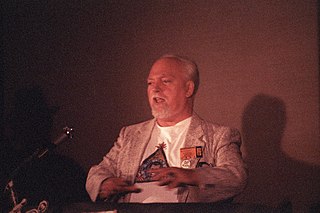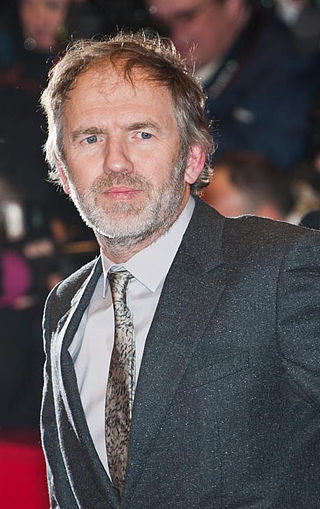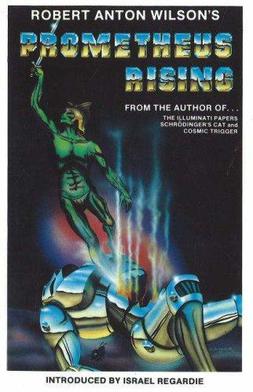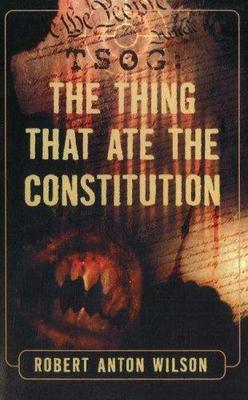
Discordianism is a belief system based around Eris, the Greek goddess of strife and discord, and variously defined as a religion, new religious movement, virtual religion, or act of social commentary; though prior to 2005, some sources categorized it as a parody religion. It was founded after the 1963 publication of its holy book, Principia Discordia, written by Greg Hill with Kerry Wendell Thornley, the two working under the pseudonyms Malaclypse the Younger and Omar Khayyam Ravenhurst.

Robert Anton Wilson was an American author, futurist, psychologist, and self-described agnostic mystic. Recognized within Discordianism as an Episkopos, pope and saint, Wilson helped publicize Discordianism through his writings and interviews. In 1999 he described his work as an "attempt to break down conditioned associations, to look at the world in a new way, with many models recognized as models or maps, and no one model elevated to the truth". Wilson's goal was "to try to get people into a state of generalized agnosticism, not agnosticism about God alone but agnosticism about everything."

The Illuminatus! Trilogy is a series of three novels by American writers Robert Shea and Robert Anton Wilson, first published in 1975. The trilogy is a satirical, postmodern, science fiction–influenced adventure story; a drug-, sex-, and magic-laden trek through a number of conspiracy theories, both historical and imaginary, related to the authors' version of the Illuminati. The narrative often switches between third- and first-person perspectives in a nonlinear narrative. It is thematically dense, covering topics like counterculture, numerology, and Discordianism.
"Fnord" is a word coined in 1965 by Kerry Thornley and Greg Hill in the Discordian religious text Principia Discordia. It entered into popular culture after appearing in The Illuminatus! Trilogy (1975) of novels written by Robert Shea and Robert Anton Wilson. Here, the interjection "fnord" is given hypnotic power over the unenlightened, and children in grade school are taught to be unable to see the word consciously. For the rest of their lives, every appearance of the word subconsciously generates a feeling of unease and confusion which prevents rational consideration of the text in which it appears.

Robert Joseph Shea was an American novelist and former journalist best known as co-author with Robert Anton Wilson of the science fantasy trilogy Illuminatus! It became a cult success and was later turned into a marathon-length stage show put on at the British National Theatre and elsewhere. In 1986 it won the Prometheus Hall of Fame Award. Shea went on to write several action novels based in exotic historical settings.

Ivan Stang is an American writer, filmmaker and broadcaster, best known as the author and publisher of the first screed of the Church of the SubGenius. He is credited with founding the Church with friend Philo Drummond in 1979, though Stang himself denied this and claimed the organization was founded in 1953 by J. R. "Bob" Dobbs.
The eight-circuit model of consciousness is a holistic model originally presented as psychological philosophy by Timothy Leary in books including Neurologic (1973) and Exo-Psychology (1977), later expanded on by Robert Anton Wilson in his books Cosmic Trigger (1977) and Prometheus Rising (1983), and by Antero Alli in his books Angel Tech (1985) and The Eight-Circuit Brain (2009), that suggests "eight periods [circuits]" within the model. The eight circuits, or eight systems or "brains", as referred by other authors, operate within the human nervous system. Each corresponds to its own imprint and subjective experience of reality. Leary and Alli include three stages for each circuit, detailing developmental points for each level of consciousness.
The 23 enigma is a belief in the significance of the number 23. The concept of the 23 enigma has been popularized by various books, movies, and conspiracy theories, which suggest that the number 23 appears with unusual frequency in various contexts and may be a symbol of some larger, hidden significance. A topic related to the 23 enigma is eikositriophobia, which is the fear of the number 23.

Quantum Psychology: How Brain Software Programs You & Your World is a book written by science-fiction writer Robert Anton Wilson, originally published in 1990. It deals with what Wilson himself calls "quantum psychology," which is not a field within academic psychology.
Reality tunnel is a theory that, with a subconscious set of mental filters formed from beliefs and experiences, every individual interprets the same world differently, hence "Truth is in the eye of the beholder". It is similar to the idea of representative realism, and was coined by Timothy Leary (1920–1996). It was further expanded on by Robert Anton Wilson (1932-2007), who wrote about the idea extensively in his 1983 book Prometheus Rising.

Anton Johannes Gerrit Corbijn van Willenswaard is a Dutch photographer, film director, and music video director. He is the creative director behind the visual output of Depeche Mode and U2, having handled the principal promotion and sleeve photography for both bands over three decades. His music videos include Depeche Mode's "Enjoy the Silence" (1990), U2's "One" (1991), Bryan Adams' "Do I Have to Say the Words?", Nirvana's "Heart-Shaped Box" (1993), and Coldplay's "Talk" (2005). He directed the films "Viva la Vida" (2008); the Ian Curtis biographical film Control (2007), The American (2010); A Most Wanted Man (2014), based on John le Carré's 2008 novel of the same name; and Life (2015), after the friendship between Life magazine photographer Dennis Stock and James Dean.

Gregory Hill, better known by the pen name Malaclypse the Younger, was an American author. He is listed as author of the Principia Discordia, which was written with Kerry Wendell Thornley and others. He was also adapted as a character in The Illuminatus! Trilogy (1975). During the early years of circulation of the Principia Discordia, rumors claimed that the author of the book was Richard Nixon, Timothy Leary, or Robert Anton Wilson; or that the book and Malaclypse the Younger were both fictional inventions of Robert Anton Wilson, as with Abdul Alhazred's Necronomicon.

Cosmic Trigger I: The Final Secret of The Illuminati is the first book in the Cosmic Trigger series, first published in 1977 and the first of a three-volume autobiographical and philosophical work by Robert Anton Wilson. It has a foreword by Timothy Leary, which he wrote in the summer of 1977.

Prometheus Rising is a 1983 guidebook by Robert Anton Wilson. The book includes explanations of Timothy Leary's eight-circuit model of consciousness, Alfred Korzybski's general semantics, Aleister Crowley's Thelema, and various other topics related to self-improvement, occult traditions, and pseudoscience. In the introduction written by Israel Regardie, Wilson's purpose for writing the book is given as unleashing humanity's "full stature".

The New Inquisition is a book written by Robert Anton Wilson and first published in 1986. The New Inquisition is a book about ontology, science, paranormal events, and epistemology. Wilson identifies what he calls "Fundamentalist Materialism" belief and compares it to religious fundamentalism.
The Historical Illuminatus Chronicles is a series of three novels by Robert Anton Wilson written after his highly successful The Illuminatus! Trilogy and his 1981 Masks of the Illuminati. His co-author from the first trilogy, Robert Shea, was not involved in this series, providing only a praising blurb.

Wilhelm Reich in Hell is a play written by Robert Anton Wilson and published as a book in 1987. The play has been staged several times, with productions in Santa Cruz, Dublin, Los Angeles, and San Francisco. The play is about Wilhelm Reich, whose writings on orgone and psychoanalysis were burned by the US government in 1956, in a fictional afterlife trial. The many factual and fictional characters in the play include Marilyn Monroe, Uncle Sam, and Wilhelm Reich himself. It has been described as a punk rock drama by Wilson. It shares similarities with The Devil and Daniel Webster, one of Wilson's favorite films in his youth.

Reality is What You Can Get Away With is an illustrated screenplay by Robert Anton Wilson first published in 1992, followed by a second edition in 1996.

TSOG: The Thing That Ate the Constitution is a book by Robert Anton Wilson published in 2002. TSOG stands for "Tsarist Occupational Government", stemming from Wilson's belief that there were strong parallels with the oppressive Tsarist government of pre-revolutionary Russia and the United States government under George W. Bush. It focuses on issues such as civil liberties, the influence of faith-based organisations on the government and the war on drugs.













